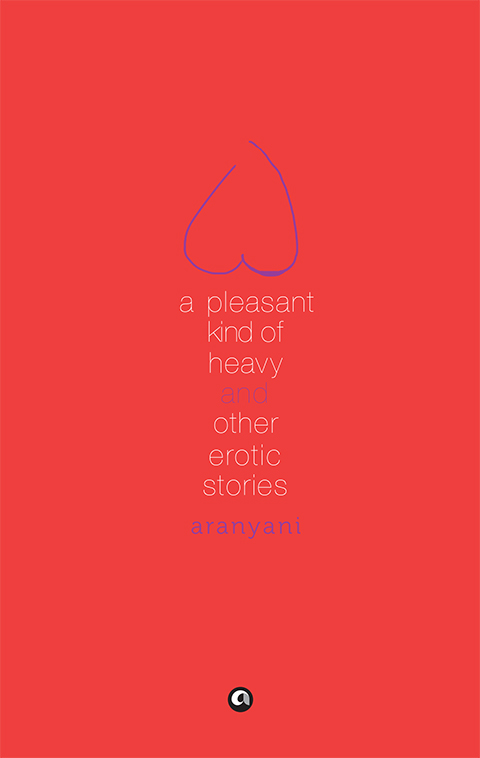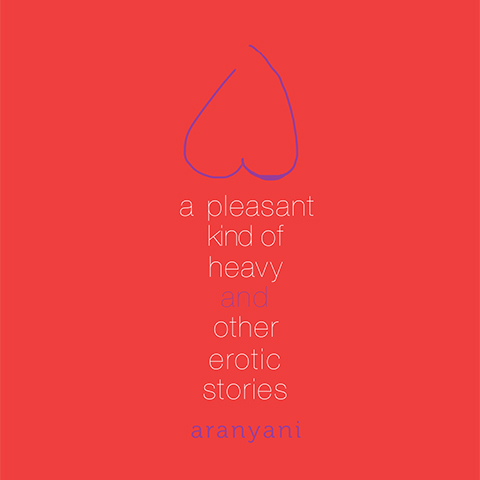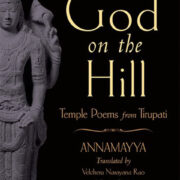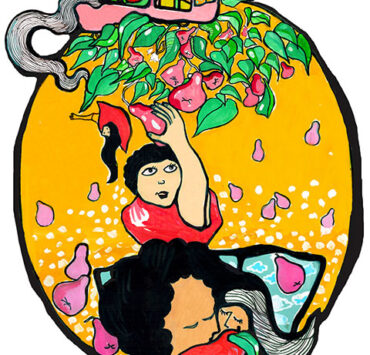The scarlet jewellery box was shaped like a closet. Inside, the indigo blue velvet that lined it had an indefinable fragrance that I longed to smell again and again. I did not have a name for it and so I could not call it up with words, necessitating frequent nuzzling to the velvet lining. Later, when I was in school, I decided the lining smelled like cashew nut, but until then, it had been of little use to describe smells with other smells that, too, did not have names.
The rectangular mirror with red, yellow and green edges that someone had given Amma as a take-home gift at a wedding also smelled like the blue lining of the scarlet jewellery box. The mirror had found its way out of its home in the vetthalai pakku bag into an embroidered orange bag that sat in my toy basket. When my friend Divya arrived, we would play doctor-doctor, using a curtain to conceal ourselves, and devising a makeshift clinic from a plastic stool thrust under the thick cotton cloth. When it felt private enough, Divya would take my temperature, and then offer the mirror as an antidote to my excessive heat. She would slide the cool smooth glass into my panties where it would kiss the soft, smooth, hairless lips of my treasure box and sure enough, draw the heat from me like condensing water does from a clay pot. When the consultation was done, and Divya took the mirror out from my panties and handed it back to me, it smelled like the lining of the jewellery box. Cashew nut.
All this happened before smelling was outlawed, before parents and school relegated the describing of smells to the chemistry lab, and perhaps—if one was very delicate about it—to the dining table. I never solved the mystery of how the lining of the jewellery box smelled like sex. For that is what it smelled like. Exactly. Not what I had thought it smelled like. By the time I added that word to that smell, I’d lost track of the box. By now I was in high school.

Excerpt from A Pleasant Kind of Heavy and Other Erotic Stories by Aranyani (Aleph Book Company). Click here to purchase.
School did not shed much light on this mystery. Except perhaps English class where Ms. Kumar, who was redolent of shikakai and hibiscus and some other nameless sweet things, invited us to smell foreign things: bread and olives and fish and garlic. Because she let us smell, we saw things we might not have otherwise been able to see. And because she allowed us a measure of freedom that the other teachers didn’t, she gave me permission to keep thinking about the mystery of that scarlet jewellery box.
This story is about what Ms. Kumar allowed us to do one November during the annual Exhibition Day. I’ve changed her name and you’ll never recognise my school from what I say so you won’t be able to get to her. Some would crucify her for what she did, but to us she was Joan of Arc and I owe her; the telling of this story is my way of repaying that debt.
Exhibition Day, occurring every November, is one of the last cocoons of glasnost under the Indian Certificate of Secondary Education System. Free from the scolding and censure of Parents Day (for all but the most conscientious students), and cushioned by a protective month before the frenzy and nerves of December’s final examinations, Exhibition Day is extraordinarily liberating. As we students reimagine Shakespeare, Archimedes and other figures from
textbooks into clay figurines, working models and colourful charts, we can literally feel our intellectual capabilities and interests expanding.
On the appointed day, long-suffering—but nonetheless patiently bemused—parents will listen as the children speak. Some will perhaps recall a glimmer of their former selves in the enthusiasm of children who speak of storybook characters as if they really mean something. Others will barely register anything, consulting their watches as they wait for the monologue to end so they can get on with their lives. Hardly anyone will notice the smell of artists’ glue lingering in the air and even if they do, they will think nothing of it.
The smells of the first doctor-doctor game, the smells that had meaning before words made them taboo, are like rooms in Bluebeard’s house: too full of buried combustibles to open safely. And isn’t this what differentiates adults from children? Knowing what is safe and being able to keep a lid on it?
Choosing a presentation-worthy topic from the literature they have studied is a process that is at once important, imperative and futile, thinks Ms. Kumar. ‘Everything we have studied is part of a whole,’ she tells her rapt tenth-standard English students. ‘When you choose something to present, you are pulling something from the whole, and if it hurts to do this then you know you are on the right track, connected to the whole as well as to the piece that you are pulling out. Like removing a petal of the flower but keeping the awareness of the whole flower.’
‘I thought this was English, not biology,’ mutters Sandeep under his breath, his veneer of disdain barely concealing the obvious—his eyes are fastened to Ms. Kumar’s blouse so closely that he can probably see the little metal hooks locked into tiny eyeholes to keep the pieces of pink material together under her translucent chiffon sari. Ms. Kumar has the habit of periodically arranging and rearranging her sari as she speaks, to the delight of the boys who crane their necks forward as if taking in her every word.
‘Aren’t you listening, idiot? It’s all related,’ retorts Rahul. Rahul is in love with Ms Kumar. He is not given to the lecherous eyeballing that Sandeep engages in, but is filled with a passionate longing, the kind that leads him to compose poetry that he sometimes reads to Ms. Kumar after class on the pretext of seeking her editorial advice. Ms. Kumar is aware of Rahul’s infatuation with her though she is careful never to let on. After Rahul’s recitals, she comments on his work with an academic, objective air. ‘Innovative, Rahul! You place the man in the Neytal mood, waiting anxiously for a secret meeting. We’ve mostly seen women in this position in the Akam Sangam poems.’
She knows, of course, that he is talking about himself and her.
In between your thighs I find my eyes:
in the two almond jewels, one set within the other, I see myself.
My lesser form, the protective wings of your lotus,
my greater, the sensitive bud of your upper chamber.
Rahul doesn’t dare read some of his other poems to Ms. Kumar.
* * *
This year I propose interactive theatre vignettes for Exhibition Day. Then Rahul says we should read from
translations of Sangam poetry. Sandeep sneers that this is sounding more like Annual School Day than like Exhibition Day but we ignore him. We talk acoustics, about how we’d organise this. Ms. Kumar congratulates us, saying this is probably the first time it has occurred to anyone that one voice can barely be distinguished from another in the melee of an exhibition; staged readings and performances will work much better. She agrees to ask the Principal for two rooms for the tenth-standard literature exhibit.
‘Love in literature,’ I announce the theme of our exhibition to my parents between mouthfuls of chapatti and podalangai kootu, carefully extracting the offending pieces of podalangai from the delicious lentils in which they are swimming. ‘I’m going to make a wall and I’m going to provide participants with scripts from Ovid’s “Pyramus and Thisbe” and we’ll read to each other from behind the wall.’ I see that they are unimpressed by this explanation, and I am forced to divulge more than I wanted to: ‘Intended to provide an experience of the clandestine-romantic, it will make the story relevant for today’s participants.’
Appa raises an eyebrow quizzically, leaving me wondering if he has even heard me. Is he going to admit that he has been reviewing bullet points for his upcoming shareholders’ meeting instead of paying attention? No. He smiles and nods: ‘Sounds good, sounds good.’ Amma has been equally preoccupied; her quarrel with Amamma this morning has been
exacerbated by the cook’s inopportune announcement that she is going home to her village for a few weeks. However, she definitely perks up her ears at the word romantic. She is, like most women, more vigilant than her male counterpart when it comes to The Consequences of Wrong Action. Amma and I have been wary of each other lately. Six months ago, going through my school notebooks, a routine practice she deems necessary because of my reluctance to communicate about my studies, she noticed the following entry in the etymology notebook that she herself had started for me.
Pussy = pucelle, virgin, orig. French.
I think she had never been less sure about where the boundaries of education should lie.
She brought it up, but eventually let it be, a budding young woman is entitled to curiosity after all and she hopes that like her, I will be able to keep my interests academic. Today, she asks me wearily—because the conversation with Amamma has already exhausted her—if my English teacher knows about this Pyramus Thisbe business. When I say yes she is relieved to drop the subject and return to her own travails, confident that the Higher Authorities will appropriately vet what she has no energy to do herself.
My higher authorities are the Big Four: Vasuda, Vidya, Sharadha and yes, myself. Sharadha and I are the only ones who are still in touch today, but I’m sure if I tracked them down, the others, too, would remember the events of the 1989 school exhibition. The Big Four are experts on romance, our lack of experience compensated by research from a selection of novels by the illustrious Ken Follett and Eric Van Lustbader stolen from my father’s bookshelves, and a Mills and Boon and Georgette Heyer that Vasuda found at her cousin’s house. All members of the club are responsible for a thorough review of their assigned book, and whoever has the most promising booty reads aloud from it to the others during our monthly sleepovers. Eventually, we begin composing our own stories because we cannot find ourselves in the ones we stole: Follet’s descriptions of quick, urgent fucking are too brief, the languid love scenes of Georgette Heyer too wispy. We take turns to add characters, Sharadha’s and my sections more bold, Vasuda’s and Vidya’s shyer yet unmistakably and poignantly erotic. This game leaves us with shiny places between our thighs and a brightness in our eyes, united in our longing, our sexual frustration temporarily staved off by the intimacy of group lust.
‘It’s like sunset,’ Sharadha says, when I tell her of my plan for Exhibition Day, ‘the love of Pyramus and Thisbe was like the sunset.’ She’d read Pyramus and Thisbe in the comprehensible Charles and Mary Lamb version of A Midsummer Night’s Dream a year before the play got on the I.C.S.E. syllabus. We both saw a production put up by the British Council last year, where a mime played the wall that separated the two lovers. ‘Sunset’, we’d defined as a particular kind of beauty, a beauty that arises in twilight, in the space between things. Not in the bright sun itself but in its glorious departure, not in Follett’s woefully inadequate descriptions of fucking but in the way we read them to each other: slowly, savouring every delectable word in the two or three paragraphs that we combed entire books for.
‘God how they waited, Pyramus and Thisbe,’ Sharadha adds admiringly. ‘See, I just can’t wait anymore. Waiting is killing me. I mean, we’re not getting married at fourteen like our great grandmothers and yet we’re still supposed to wait patiently? How for God’s sake? Somebody give me that training manual!’ We shake our heads nonplussed, falling silent as we contemplate our reluctant chastity.
I had always known I was an early bloomer. I felt lonely and would have felt worse if it wasn’t for the club of four. I love Appa and Amma with that special love reserved for those whom we have known all our lives but I don’t think they understood much about the awakening of a young girl’s romantic imagination. None of our parents seemed to. And yet we knew something was happening. South India is a confusing place to become a young woman: everyone seems so close but we are witness to so little physical embrace, so little touch. How else to explain the heady warmth that filled us when we saw the Iranian men at the Cozy Café at Elliot’s beach greeting each other with kisses to the cheek.
Outside my house, by the barbed wire that seals in the compound, there are tiny, curly, rain-moist, green filaments of morning glory which progress daily towards the fence around which they will eventually entwine. They know that there will be something to hold on to eventually if they keep growing. It’s a bit like that when you’re coming of age, but unlike the tendrils, you’re not sure if it’s worth reaching out, if there will be something to hold on to eventually.
* * *
The whispered undertones of young female voices
Playful harmony in the night air.
The crickets and cicadas
are distracted from their own voices.
Lost in the promise of turning-into-women.
Rahul’s voice rattles around the classroom. Today he is particularly nervous, shuffling through a sheaf of his new poems, reading from selections he hopes will be part of the Exhibition.
After class he hands Ms. Kumar a sheaf of poems. She will read them later in the soft light of her bedroom when she is spent from the day. Her slight frame will soften under the weight of his words and she will become liquid in their presence. When the last page of paper floats from her clasp and is blown by the breeze of the fan to the floor she will rise from the bed not to retrieve it but to lock the door and strip, to stand naked before the mirror bathed in the gaze of the Adored. She will gaze deep into her own eyes, pinch her buttocks and nipples and glide the edge of her hand up and down her pubis until she shudders softly in the gentle wash of orgasm.
This is what Rahul hopes.
* * *
On Exhibition Day, mindful of the effort I have been putting into constructing the cardboard and plaster wall that was loaded into the car the previous night, Amma suggests I stop by the puja area to seek God’s blessings. ‘Already done, Amma,’ I respond piously as I eat my cornflakes and milk, recalling my visit to the Lord. A tin box of toffees has been sitting by His side since Madhav Periappa visited from London last week.
God is the guardian of all unrefrigerated delicacies in my mother’s household. If one wants something extra for the lunchbox, a piece of golden-fried thathai that crunches in the mouth, or a slice of the dark, slightly bitter chocolate-cake that can be found in the Stay-Fresh purple dabba, one must encounter Krishna, in His riveting Tanjore painting avatar, sitting on the upper shelf of the puja room-cum-pantry. This God is buff and cut, His thighs look good enough to bite into, this God puts desperate young girls out of their misery by drawing them from their beds with the power of His flute. This is a God whom you can adore instead of beg favours from at exam time. This God understands my need to take flight from the security of the house, to run in the open fields, to frolic like a milkmaid. This God has shown that passionate love is worth risking everything for. This God, if the Amar Chitra Katha comics are anything to go by, seems to favour girls who are built like me: slender, small waisted with budding breasts, although the girls He adores are more suitably dressed for His amorous overtures than I will ever be allowed to be either at school or at home.
* * *
The long, droning hum of regurgitated school lessons fills the hallways outside the auditorium and adjoining classrooms that have been commandeered for the Exhibition. In Classroom A, Ms. Kumar is patrolling—no, surveying—our exhibit. She stops before a school desk and chair in front of my ‘brick’ wall, complete with dusty curtains, a relic of last year’s school play, that create a little enclave that shelters the setup. Poking out from underneath a table behind the wall, on which are placed cups of water, some snacks and a Xerox copy of the Pyramus and Thisbe script, is a pair of clean-shaven legs that end in blue and white tennis sneakers, waiting, tapping on the floor impatiently.
It has been a disappointing day. I haven’t had as many visitors to my booth as I’d hoped and I’m frustrated that a few of the people who came in just read the scripts silently and left. Sometimes an idea is seductive in its inception, less so when it gets translated into reality and I badly do not want this to be one of those.
‘My love thou art, my love, I think.’ I’m excited to recognize Ms. Kumar’s voice on the other side of the wall reading Pyramus’s part. I barely glance at the script, since I’ve read the words to myself eight or nine times today. I remember what she said about how stage actors bring freshness to any role they play, every time they essay it. By the time we finish I am pleased with my performance.
When we come to the end, I realise Ms. Kumar is not alone. ‘Clever project and slickly executed,’ says a man’s voice, perhaps Mr. Janikiraman, the music teacher with whom, it is rumoured, Ms. Kumar is great friends. Then a barely audible female voice, perhaps Ms. Rajul who teaches English grammar, hisses: ‘Shakuntala, do you have any idea how much trouble you could get into for allowing this?’
We knew her first name of course, but we’d never heard it uttered.
‘Oh please,’ Ms Kumar responds. ‘She’s not going to learn it in biology. Let her learn it in literature.’
I am left trembling, an overwhelmed Charles Darnay. My legs are shaking. I look down at them: slender thighs and a length of blue uniform skirt that stops just before a pair of knobby knees that descend to hard-won depilated legs, the result of a victorious battle over hair removal with my mother a few years earlier. I’m breathing fast. I rest my forearms on the desk, and let my forehead sink on to them.
‘Hey,’ Sharanya slides behind the construction and comes to sit on the chair behind me, drawing up her legs and hugging her knees. ‘Are you done for the day?’
I open my mouth to tell her and then I hear my muezzin’s call: ‘Thisbe? My love thou art, my love, I think?’ I look down to see a pair of tennis shoes sitting across from mine, and just above them, blue pants. One of the boys. I put my finger to my lips and Sharanya mimics me.
‘This is just a wall, not my Thisbe at all.’ As he speaks his foot touches mine.
I am exhilarated from the pleasant shock of the light pressure against my foot. ‘Tide life, ‘tide death, I come without delay.’
Years later, I still wonder if the events of that day may have unfolded differently if Ms. Kumar had kept silent, had not responded as she did to Ms. Rajul. See, when she enjoyed my theatrical piece Ms. Kumar gave me permission to exist, to be as I was, and because that happened, I was able to smell the boy, just as I was able to smell that jewellery box from my childhood.
He smells salty, as if he’s been sweating a bit, and he wears a musky cologne. I lift my foot and press it upon his.
‘O kiss me through the hole in this vile wall.’
‘I kiss the wall’s hole, not your lips at all.’
He puts his hand underneath the table and places it lightly on my skirt, just above the machine-sewn hem and inches short of my inner thigh. Then he firms his grip and quells my shaking. I’m as scared as I’ve ever been, no amount of preparation, nothing I’ve ever read, could have gotten me ready for what this feels like.
His hand finds its way under my skirt, a finger tentatively strokes the melting inside of my thigh. I want to stand up and yell out loud: touched at last!
I turn backwards to Sharanya like a traveller turning for a last glance at the railway platform before beginning his journey. Her eyes are circles of wonder, her mouth a round ‘O’ upon which she has clasped a hand to ensure her silence. She nods her head at me, vigorously. I dig my nails into the hand. He starts and I jump slightly, the shaky apparatus of our privacy wobbles, threatening to come down between us. He grabs the table with one hand and I see his hand clearly: dark, dark with reddish palms.
As he steadies himself, his knee shoots forward and arrives between mine exactly at the moment I pull my chair slightly towards the table for support. They bump: his knee and my pussy, and the sensation causes me to adjust my chair again, and then my hips, so that my pussy bumps into his knee again. And again. Small, quick, rapid movements. The image of a train chugging up an incline comes to me, gathering momentum, going faster and faster, then I go numb, before being transported by an exquisitely fierce sensation to a plane I didn’t know existed. When I return I am hot, grateful and confused.
‘Thus Thisbe ends. Adieu, adieu, adieu.’ I turn and touch Sharanya’s hand very gently. She squeezes mine. Her eyes are pink with emotion. Very slowly we stand, her feet slowly coming to the ground, my legs gently pushing aside the chair as we stand to face the room.
Home, as a notional space, has been a predominant theme in this year’s Literature Room exhibits. On the far side of the room sits the Strawberry Pink Villa from My Family and Other Animals. Closer to us is the Heaven-and-Road conceptual home of R. L. Stevenson, the home-turned-graveyard of Tennyson’s Bess, the landlord’s daughter, even the dreamed-of home that Rabindranath Tagore wants to wake up in. Next to it is Kamala Das’s Grandmother’s House and right beside it my favourite of 1989’s creations: a bookcase, simply adorned with all the works we have read in the last four years; the collections of stories and poems with which we will go out into the world, for some the beginning, and for some the last literature they will read.
Excerpt from A Pleasant Kind of Heavy and Other Erotic Stories by Aranyani published by Aleph Book Company. Rs. 295. Click here to purchase. Copyright © Aranyani. All rights reserved.








Wow. This was some pretty terrific writing. I look forward to the book.
Not bad!